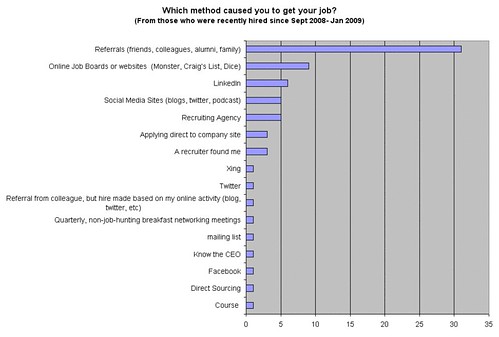This is part 1 of an ongoing community project to help people understand how to get jobs during a recession.
This data is slightly skewed towards those that are already active in social media as the survey went to those within my network on my blog and the highly connected Twitter community. There were 214 respondents to the survey although this graphic only represents those who got jobs since Sept 2008 (71 respondents) that represent those that were hired during the announcement of the recession. This is a personal research project, and is not tied to my employer, clients, or anyone else for that matter.
Finding 1: Most Recent Hires Got Jobs from Referrals from Friends, Colleagues, Alumni, or Family
This is just the data from the 71 respondents that got hired since Sept 2008 (since the recession started).
Most (43%) get their jobs through their immediate online network of friends, colleagues, alumni, or family. Although a big gap the second (12%) most used method was through online job boards or websites. Some suggested on Twitter that in Europe or Asia this is the primary method of job seeking –unlike the highly wired online job market in US, I did not ask location question to verify. This could also be due to the fact that my network are people already using social media and are hyper-connected to each other.
I had no idea this method would have been so high, if it were, I would have asked separate questions to break that out into different referral methods.
Recommendations for Job Seekers in a Recession
First of all, considering the massive layoffs, almost everyone should be exploring a backup plan Job seekers should nurture their relationships with their peers first. Job seekers should continually keep their network educated about their new projects, skills, and work they are taking on, consider using LinkedIn, Facebook, professional website or a blog They should reach out and connect with their network before they need them. Interact with them in email, social networks, phone and good ol fashioned lunch meetings
To find the other results from this survey, I’ll be tagging the post “Job Survey” and you can click that category to learn more. Thanks to my wife who helped cut, cleansed, and graphed the data it in 1/10th the time it would take me. (and during our vacation in Hawaii!)
Coming soon I’ll be posting results for: top industries hired, compensation rates, and duration spent looking for a job in a recession
Resources: See my Web Strategy Job Board

I recently gathered together some articles for recruiting research that might be helpful for job seekers and recruiters: http://delicious.com/droidattack/recruiting
I hope at least one of the links I’ve gathered will be helpful.
Very intriguing results.
I’d love to see a Survey #2 with the breakdown of referrals. Part of this is to see if they were from social networks, offline (word of mouth), online (friends, e-mail), online (friends, across states or nations), and if they are social networks which ones and how (a simple status update, multiple status updates, perhaps even a job posting on multiple professional groups?).
I guess I did expect referral to be #1, but I did not expect the percentage to be as high as it is.
Was a clear definition of referral given in the context you were analyzing it? The reason I ask is this is this is aimed solely at the audience of the survey. To me even Twitter, Facebook, knowing the CEO, and other social media sites could be considered “referrals” depending on the use case scenarios.
Great work! I’d love to see a Survey #2 with more in depth analysis. Your work makes the world go round.
Cheers,
Craig
Is your sample representative?
Jeremiah – was reading through an oldy but a goody this past weekend – The Tipping Point – and came across something that reminded me of this post…
Gladwell talks about a study by Mark Granovetter, conducted in 1973, titled “The Strength of Weak Ties”. The link to the paper is below, but in short – he talks about how a person’s weak ties are indispensable to their opportunities and integration into their community…
So it isn’t that people need to be developing deep social ties in order to find jobs – the networking is what counts.
http://www.stanford.edu/dept/soc/people/mgranovetter/documents/granstrengthweakties.pdf
I’m curious to know what the sample population looks like for this survey? Does the sample reflect the general population of the united states? Likely not. I read in one of these comments that the data was collected through the internet. Already with only one mode of data collection the results are scewed. Internet users trend toward those with college degrees who are male. This is some interesting insight, but probably a glance of one segment of the population and not the entire landscape.
it is interesting and informative article. This has been very helpful understanding a lot
of things. I™m sure a lot of other people will agree with me.
[url= http://www.newera-hats.com] wholesale new era hats[/url]
sports shoes
Nike Sport Shoes
Women's Nike Sport Shoes
Men's Nike Sport Shoes